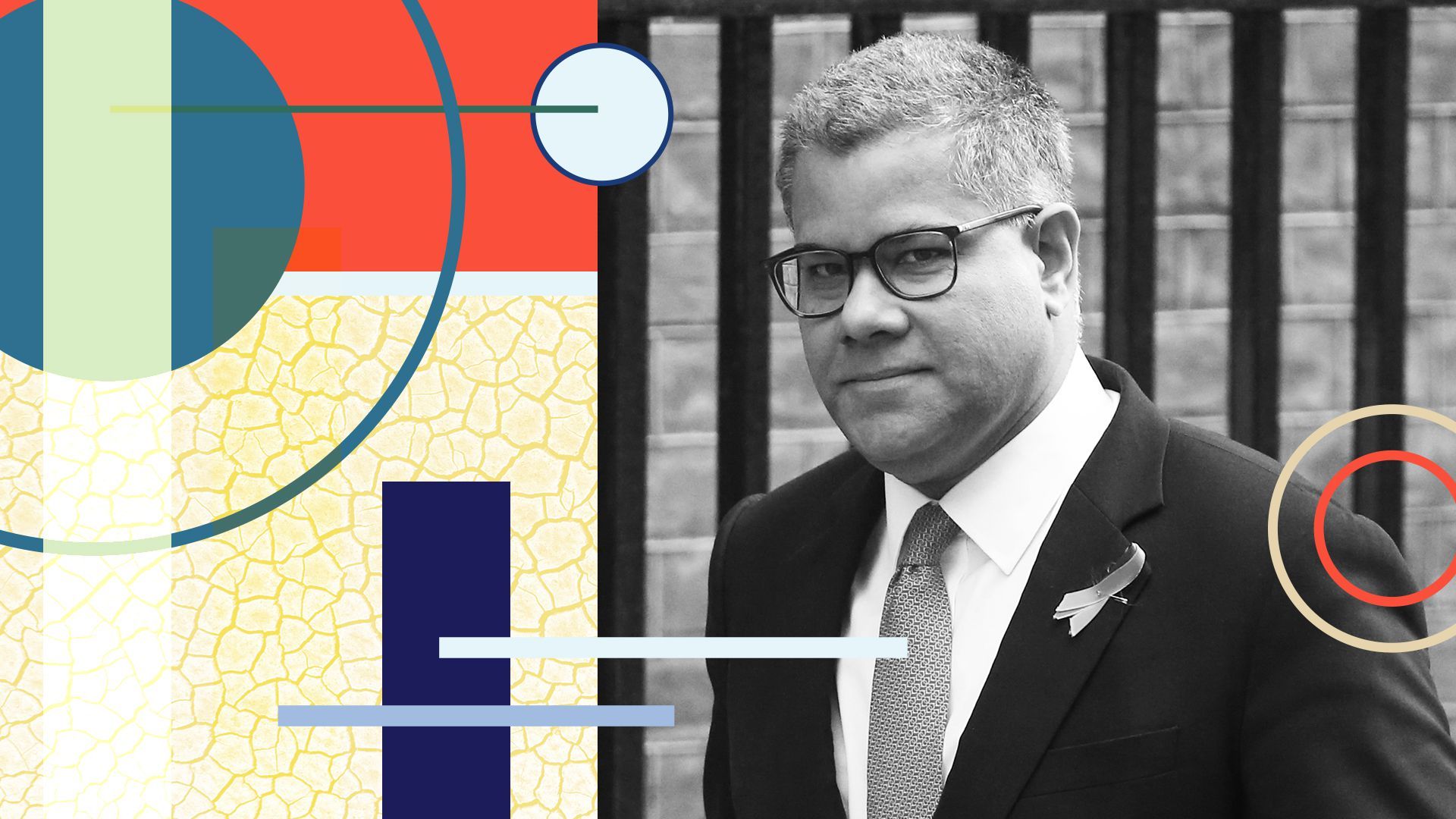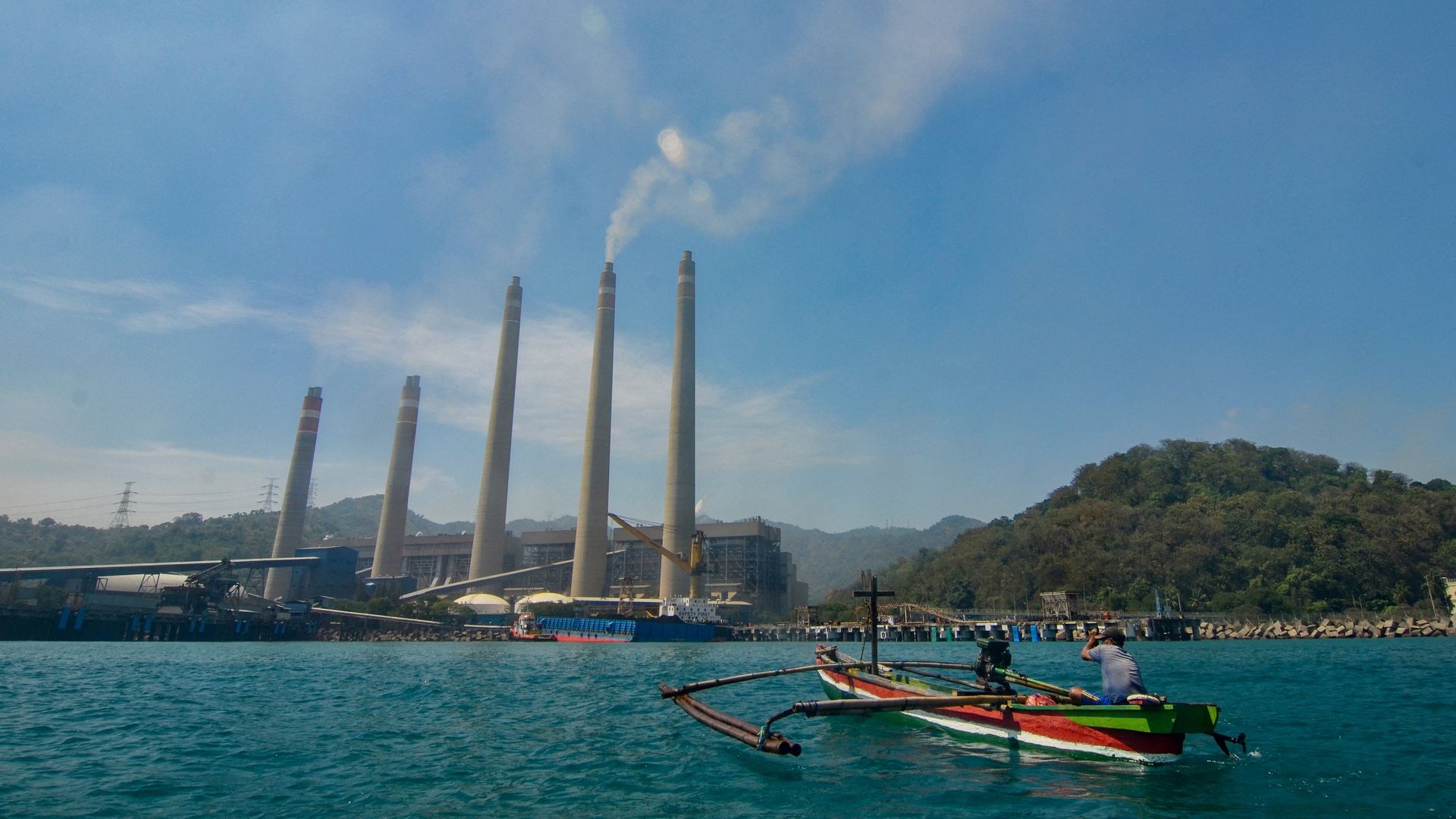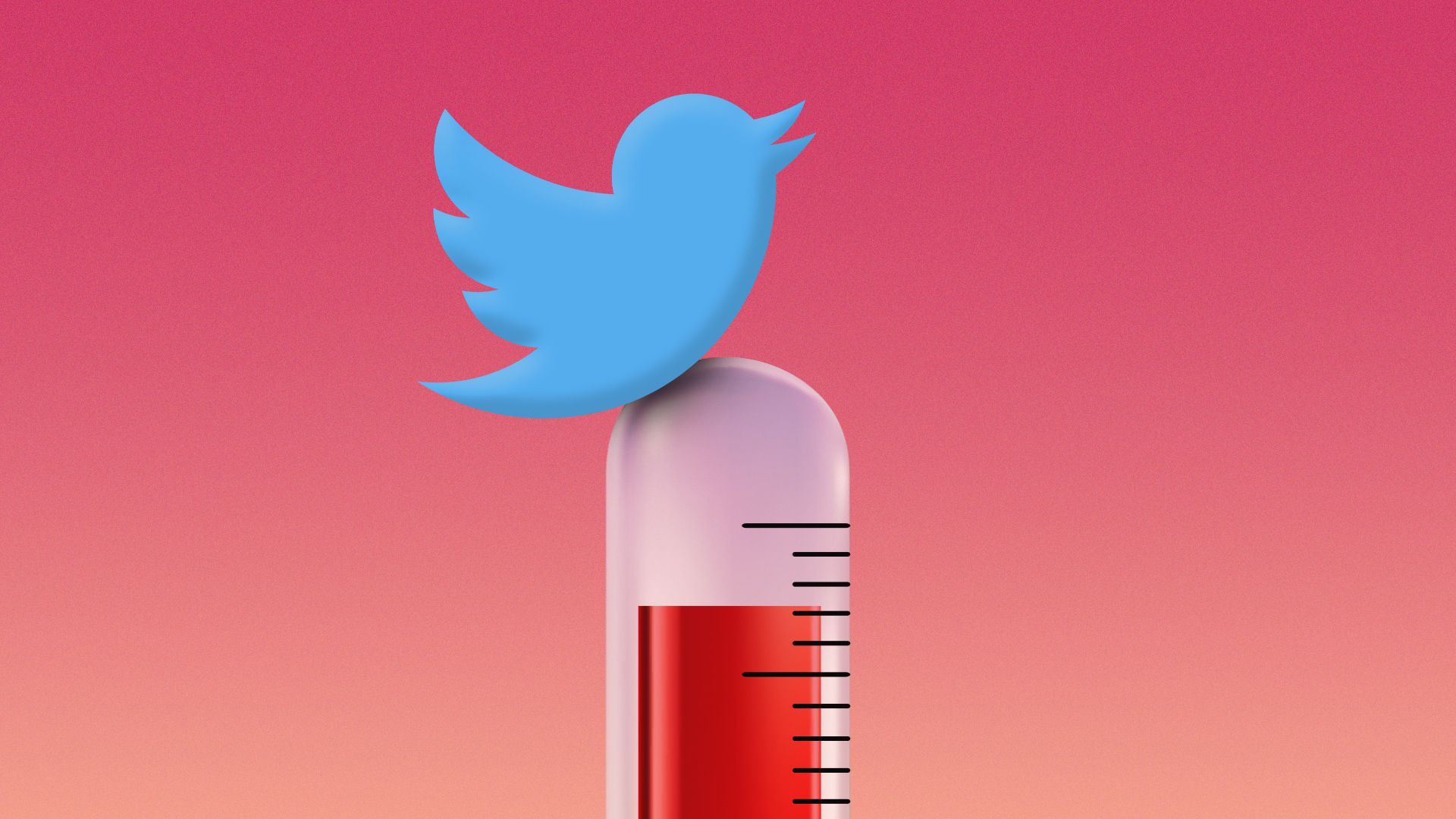| | | | | | | Presented By ExxonMobil | | | | Axios Generate | | By Ben Geman and Andrew Freedman · Apr 25, 2022 | | 👋🏽 Hi readers! Today's Smart Brevity count is 1,214 words, 5 minutes. 📬 Did a friend send you this newsletter? Welcome, please sign up. Also, you can reply to this email to say hi and offer tips. 🎶 Today marks the 2000 release date of Neil Young's lovely album "Silver & Gold," which provides today's intro tune... | | | | | | 1 big thing: COP26's head on the fight after the fight |  | | | Photo illustration: Shoshana Gordon/Axios. Photo: Hollie Adams/Bloomberg via Getty Images | | | | The British politician who helped prevent a fractious United Nations climate summit from collapsing last year now faces another daunting task: keeping climate on the global agenda amid Russia's unprovoked war in Ukraine, Andrew writes. Driving the news: Alok Sharma spoke with Axios over the weekend, offering revelations about his strategy in the uphill battle to keep the Paris Agreement's targets from slipping away. The big picture: Sharma said the 1.5-degree target should remain the focus leading into the next climate summit in Sharm el-Sheikh, Egypt, in November. - He said his game plan is to push for climate change sessions at meetings of world leaders or ministers, such as the G-7, to ensure climate change doesn't slip off the list of priorities.
- He's seeking to ensure that countries translate their pledges from Glasgow into concrete actions as soon as possible.
Between the lines: "When I've traveled around the world talking to communities on the frontlines of climate change, that's actually what they say. Literally, every ratchet up makes a difference in terms of the impact of lives and livelihoods," Sharma told Axios. "So I think we have to hang on to the 1.5-degree target." Threat level: Sharma's main concern right now is the lack of "bandwidth" that leaders have due to the war in Ukraine, and ensuring a continued focus on global warming solutions. - Policymakers need to know climate change is a "chronic threat" that is not going away, he said.
- "Every fraction of a degree makes a difference," he said, noting we are already at 1.1°C of warming.
Why it matters: Recent UN climate science panel reports and other studies show dim chances of limiting global warming to 1.5°C above preindustrial levels, a Paris goal that leaders reaffirmed in Glasgow. If warming exceeds this target, research shows, the risk of potentially catastrophic climate impacts grows. The intrigue: Pressed further about the feasibility of the 1.5-degree Paris target, Sharma said the stakes are simply too high to abandon it. - He cited an impassioned speech Barbados Prime Minister Mia Mottley gave at COP 26.
- "She said, you know, 2 degrees is 'a death sentence' for her country. And it's not just her country. I mean, there are millions and millions of people across the world, for whom 2 degrees will be a death sentence," Sharma said.
- "We have to do absolutely everything we can to hang to that target of 1.5 and keep pressing and pressing," instead of moving to another target.
Yes, but: Time is an issue, but Sharma emphasizes positive signs like the plunging costs of renewables. "This is going to be the decisive decade, right? So the moment of truth will be upon us over the next few years," Sharma said. |     | | | | | | Bonus: Sharma on the next transition partnership |  | | | Fishermen on their boat as smoke rises from chimneys at the Suralaya coal power plant on the Indonesian coast. Photo: Ronald Siagian/AFP via Getty Images | | | | During COP 26, the U.S., Britain, France, Germany and the European Union unveiled an $8.5 billion initiative to help transform South Africa's electricity sector away from coal and toward renewables, Andrew writes. The intrigue: Sharma said policymakers are currently exploring options for another transition partnership, with some of the discussions focused on Southeast Asia. - Countries such as Indonesia are heavily reliant on coal for their electricity, for example. Vietnam has also come up in energy policy circles as a possible partnership country, though Sharma would not name any specific nations under consideration.
What they're saying: "I think what we would like to do, ideally, is to be able to announce in principle some more of those types of transition plans by the time we get to Sharm el-Sheikh," Sharma told Axios, referring to COP 27 in November. |     | | | | | | 2. Big Oil earnings arrive amid political pressure |  Data: Yahoo Finance; Chart: Kavya Beheraj/Axios The world's largest oil companies will begin reporting Q1 earnings this week following a three-month stretch that saw the highest prices in well over a decade, Ben writes. Driving the news: TotalEnergies reports on Thursday, while Chevron and Exxon — which recently signaled it's poised for a quarterly record — follow on Friday. What we're watching: The expected eye-popping numbers are likely to fuel Democratic political criticism of the sector. - We'll also be watching for further news about the industry's energy transition efforts.
- It's the first quarter Shell — which reports May 5 — will separately release results for its "renewables and energy solutions" unit.
Speaking of Exxon, workers are refusing to represent the global energy company at an upcoming Pride celebration in Houston, Bloomberg first reported. Why it matters: Internal response to Exxon's policy change is one example of workers expanding their voice and power to social issues. Axios' Hope King has the story. |     | | | | | | A message from ExxonMobil | | Energy for today and solutions for tomorrow | | |  | | | | At ExxonMobil, we're working to supply the energy the world needs while also developing lower-emission fuels. Innovations like renewable diesel made from plants could reduce emissions from trucks by about three million metric tons per year compared to conventional fuels. | | | | | | 3. Oil demand projections cool | | The oil market may be loosening up, partly for a reason that has become all too familiar — COVID-19, Ben writes. The big picture: "The ongoing war in Ukraine, Covid-19 lockdowns in China and surging commodity prices are going to take a significant bite out of global oil demand this year, with the potential to calm high prices," Rystad Energy said in a note Friday. It now sees global demand this year at lower levels than in 2019, "with a rebound unlikely until at least 2023," senior VP of analysis Claudio Galimberti wrote. Driving the news: Oil prices continued their week-plus decline this morning. Brent crude is trading at roughly $102, well over $10 lower than it was a week ago. Go deeper: Oil slides as Shanghai lockdowns stoke demand fears (Reuters) |     | | | | | | 4. Twitter toughens policy on climate denial ads |  | | | Illustration: Gabriella Turrisi/Axios | | | | Twitter will not allow "misleading advertisements" that "contradict the scientific consensus on climate change," the social media platform vowed in an Earth Day statement Friday, Ben writes. Why it matters: Inaccurate climate information has been common on social media sites. But platforms including Facebook, Google and YouTube have unveiled efforts in recent years to try to deter circulation and steer users to accurate sources. Driving the news: "We believe that climate denialism shouldn't be monetized on Twitter, and that misrepresentative ads shouldn't detract from important conversations about the climate crisis," Twitter sustainability execs Seán Boyle and Casey Junod said in a post. They said the approach would be "informed" by authoritative sources including UN Intergovernmental Panel on Climate Change (IPCC) reports. Yes, but: It's not wholly new. "Before [Friday], advertisements denying climate change would have been rejected or halted per our Inappropriate Content policy," spokesperson Elizabeth Busby said via email. "The introduction of this formalized policy is to reinforce our commitment towards sustainability, drawing on IPCC assessment reports and input from global environmental experts." Read more. |     | | | | | | 5. Commerce Department elevates climate concerns |  | | | Photo illustration: Shoshana Gordon/Axios. Photo: Ting Shen/Bloomberg via Getty Images | | | | Commerce Secretary Gina Raimondo rolled out a department-wide order on climate change on Friday, Andrew writes. It includes the creation of a Climate Council headed by the deputy commerce secretary. Why it matters: By placing climate change, including environmental justice issues, at center stage within the department, a wide range of constituencies may be affected. The big picture: The Commerce Department is home to a hodgepodge of organizations, from one of the top climate science agencies to the Census Bureau and the office that coordinates commercial space activities. It is also host to the Patent and Trademark Office, which is involved in emerging climate tech. Zoom in: The order could yield new work on the economics of climate change, via the Bureau of Economic Analysis, and research on the effects of climate change on individual households and businesses, from the Census. - It also calls for a formal review of the climate programs spread out across the National Oceanic and Atmospheric Administration.
|     | | | | | | A message from ExxonMobil | | We're working to ensure energy security and advance innovation | | |  | | | | At ExxonMobil, we're working to produce the energy the world needs today, while developing new, engine-ready fuels for tomorrow. Solutions like renewable diesel, advanced biofuels, and eFuel made with captured CO2 could help reduce emissions by up to 85% compared to conventional fuels. | | | | Thanks so much for reading, and see you back here tomorrow. |  | It's called Smart Brevity®. Over 200 orgs use it — in a tool called Axios HQ — to drive productivity with clearer workplace communications. | | | | | | Axios thanks our partners for supporting our newsletters. If you're interested in advertising, learn more here.
Sponsorship has no influence on editorial content. Axios, 3100 Clarendon Blvd, Suite 1300, Arlington VA 22201 | | | You received this email because you signed up for newsletters from Axios.
Change your preferences or unsubscribe here. | | | Was this email forwarded to you?
Sign up now to get Axios in your inbox. | | | | Follow Axios on social media:    | | | | | |
Post a Comment
0Comments